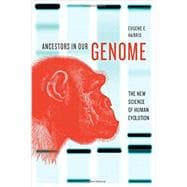In 2001, scientists were finally able to determine the full human genome sequence, and with the discovery began a genomic voyage back in time. Since then, we have sequenced the full genomes of a number of mankind's primate relatives at a remarkable rate. The genomes of the common chimpanzee (2005) and bonobo (2012), orangutan (2011), gorilla (2012), and macaque monkey (2007) have already been identified, and the determination of other primate genomes is well underway. Researchers are beginning to unravel our full genomic history, comparing it with closely related species to answer age-old questions about how and when we evolved. For the first time, we are finding our own ancestors in our genome and are thereby gleaning new information about our evolutionary past.
In Ancestors in Our Genome, molecular anthropologist Eugene E. Harris presents us with a complete and up-to-date account of the evolution of the human genome and our species. Written from the perspective of population genetics, and in simple terms, the book traces human origins back to their source among our earliest human ancestors, and explains many of the most intriguing questions that genome scientists are currently working to answer. For example, what does the high level of discordance among the gene trees of humans and the African great apes tell us about our respective separations from our common ancestor? Was our separation from the apes fast or slow, and when and why did it occur? Where, when, and how did our modern species evolve? How do we search across genomes to find the genomic underpinnings of our large and complex brains and language abilities? How can we find the genomic bases for life at high altitudes, for lactose tolerance, resistance to disease, and for our different skin pigmentations? How and when did we interbreed with Neandertals and the recently discovered ancient Denisovans of Asia? Harris draws upon extensive experience researching primate evolution in order to deliver a lively and thorough history of human evolution. Ancestors in Our Genome is the most complete discussion of our current understanding of the human genome available.








